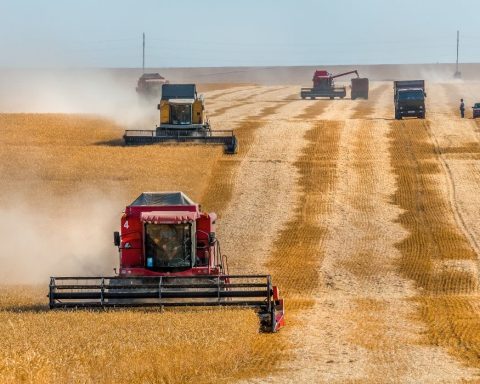Let them eat meat.
This was one of the unspoken conclusions of the latest report by the Intergovernmental Panel on Climate Change (IPCC), released last month, which offered dire warnings about the future of the planet but failed to recommend shifting to a plant-based diet. Delegates from Brazil and Argentina – two of the largest beef-producing countries in the world – appear to be behind the elimination of the plant-based language that was reportedly in previous drafts.
A version of the report, leaked by climate group Scientist Rebellion, included these lines: “A shift to diets with a higher share of plant-based protein in regions with excess consumption of calories and animal-source food can lead to substantial reductions in GHG emissions… plant-based diets can reduce GHG emissions by up to 50% compared to the average emission-intensive Western diet.” Argentina’s secretary for climate change, Rodrigo Rodriguez Tornquist, requested that that paragraph be eliminated, according to documents obtained by Unearthed, Greenpeace’s investigative outlet. In its place, the language was shifted to the vague recommendation of “balanced, sustainable healthy diets acknowledging nutritional needs.”
This muddied messaging fails to lay out what adopting a sustainable diet actually entails. Such omissions are nothing new for these reports. After another draft report leaked in 2021, Unearthed analysis showed that Brazil and Argentina “have been diligently pushing to delete references to ‘plant-based diets,’ meat as a ‘high-carbon’ food, and ‘Meatless Mondays’ for years,” reports Quartz.
There’s no question that meat and dairy harm the planet. And research shows that transitioning to a plant-based diet can bring down emissions significantly. A 2022 study found that every dollar invested in such a transition away from meat and dairy would result in 11 times more emission reductions than investing that same amount of money in zero-emission vehicles.
According to the UN’s Food and Agriculture Organization (FAO), meat and dairy production contribute 14.5% of global greenhouse gas emissions, but estimates have varied widely, with FAO’s findings at the lower end of the spectrum. Studies show that meat and dairy also account for more than 80% of farmland use and a whopping 57% of all food-production emissions.
None of this is news to the scientists who work on IPCC reports, but they don’t get final sign-off. “The IPCC’s own scientists have recognized: animal agriculture is a major contributor to global greenhouse gas emissions,” says Delcianna Winders, associate professor of law and director of the Animal Law and Policy Institute at Vermont Law School. “That the IPCC permitted lobbyists with vested interests in perpetuating some of the worst contributors to climate change to override scientists’ recommendations about those very contributors is nothing short of treacherous.”
Similar lobbying has influenced language changes related to fossil fuels in IPCC reports. An earlier version of the 2021 report also recommended phasing out fossil fuels, but this language didn’t make it into the final version. Delegates from Saudi Arabia and other oil-producing countries were reportedly responsible for the more “technology neutral” language of the final report, according to climate journalist Michael Thomas.
Saudi Arabian delegates made changes throughout the report, Thomas reported in his newsletter, Distilled, to present carbon capture and storage (CCS) as a key climate solution. But CCS has been condemned by some climate scientists as an unproven technology and distraction that lets fossil fuel companies continue extracting oil and gas.
Though the IPCC told the BBC in 2021 that its “processes are designed to guard against lobbying – from all quarters,” it appears this is not actually the case. Delegates get the chance to weigh in after scientists have made their recommendations and before the reports are published. And letting delegates lobby for changes to important messaging because of economic concerns can undermine the science, and ultimately stall efforts to mitigate the impacts of planet warming.
“We are on the brink of climate catastrophe,” says Winders, “and have no time for this sort of Orwellian obfuscation.”





